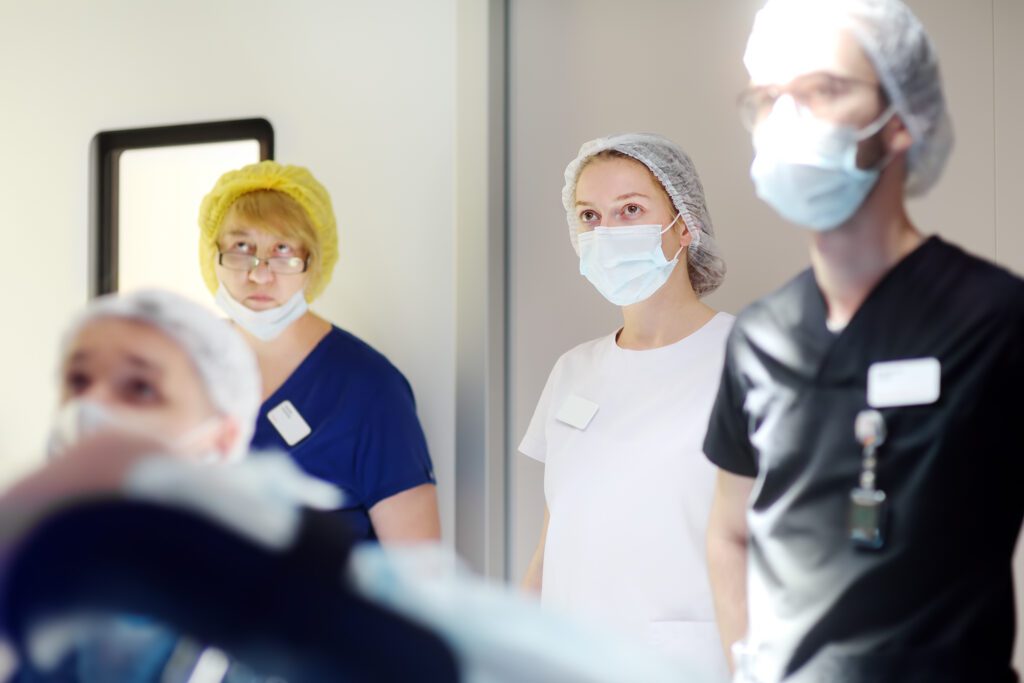Soft Skills in Medicine: Communication, Empathy, and Teamwork
- by
- Nov 13, 2023
- Reviewed by: Amy Rontal, MD

While learning physiology, pathology, and pharmacology are a major part of medical school, another equally important aspect is developing your skills in providing compassionate care and working effectively in a team setting. These latter competencies, known as “soft skills,” broadly describe our ability to communicate, demonstrate empathy, adapt to different situations, and solve problems. Soft skills in medicine really matter, so in this post we’ll take a look at how you can use them to become a better doctor and colleague.
Soft Skills in Medicine: Why They Matter & Tips for Improving Them
Let’s begin by examining an age-old question: can soft skills be learned, or are people just born with them?
Can Soft Skills be Learned?
The idea that soft skills can’t be developed if you aren’t “born with them” is a myth. Just as an athlete can train a weak muscle to make it stronger, you can train and develop your soft skills so that they become an asset.
In both cases, it’s just a question of putting the time in. Just like an athlete has to put the work in at the gym, if you want to develop your soft skills, it’s going to take some dedication. One of my favorite sayings in the hospital is, “how you do anything is how you do everything.” The habits that you form in medical school will carry on into your future career, so be thoughtful with anything that you do. Get into the habit of working on your soft skills now!
How I Developed My Soft Skills During Medical School
I have fond memories of Introduction to Clinical Medicine, a longitudinal course during the preclinical portion at my medical school that focused on taking histories and physical exam skills. My second day in medical school, I had the opportunity to interview my first patient in the hospital who recently underwent an operation for removal of a vestibular schwannoma.
At the time, I didn’t know which questions I should ask, and how to discuss sensitive topics in a way that also showed respect for her feelings. Now, a few years later, I’m confident in my ability to have natural conversations with patients in which I can get all the relevant information I need while also making them feel supported. The moral of the story is, trust the process and your years of training!
So yes, be assured that soft skills can be learned. Now, we’ll take a look at how you can start using them in your interactions with patients.
5 Ways You Can Practice Soft Skills at the Bedside
“May I only see a person in need.” This is my mental framework for every patient I work with. Remember, what may be a routine day for us could be a life-altering day for a patient, so it’s vital that we act with their best interests at heart.
To help you do this, I’ll share some key nuggets and strategies I’ve gathered over the years that have set me up for success in my patient interactions.
1. Introduce yourself.
First, always introduce yourself to the patient, stating your name, position, and team you’re on. Patients often have a plethora of different physicians and staff coming into their room, so saying you’re from the surgery, critical care, or medicine teams to name a few can be a huge help.
Check out this post for more detailed instructions on how to introduce yourself to patients!
2. Use friendly body language.
Body language also matters during patient encounters. Use it to show you’re truly listening to the patient, not just hearing them. For example, it’s helpful to maintain good eye contact and position your body towards them. Looking down at your phone or turning your head towards the television may give the appearance that your attention is elsewhere.
In addition, especially in longer interviews like when gathering a full history, it’s a good idea to sit so that you’re eye-to-eye with the patient. This can put them at ease and increase their comfort level.
3. Don’t fill the silence.
During the course of the interview, there may be periods of silence. While this may seem awkward at first, silence can be just as powerful as words. It gives the patient time to process their emotions. They may resume speaking to express their feelings or extend the silence further.
When pausing in the middle of discussing a difficult topic, it may be appropriate to show a gesture of support like putting your hand on their shoulder or offering them a tissue. Once the time is right, you can then carefully navigate the conversation as you see best. It takes time to get used to silence, but putting it to use can be highly effective.
4. Ask if they have questions.
Another key part of nurturing a healthy relationship with your patient is to always ask if they have questions. You can do this during the interview or at the end, but it should be done during every patient encounter, no matter how brief, as it demonstrates that you value ensuring their concerns are addressed. Sometimes the medical student spends the most time with a patient and you can help your team out by checking in on them.
5. Practice empathy.
Do not get so caught up in the medicine that you lose track of the patient’s humanity. Giving the patient words of encouragement and commending them for their strength can have powerful and lasting effects.
During my white coat ceremony, an attending talked about the power of “talk-o-caine.” The spirit he conveyed is that sometimes our behavior can have the same soothing properties as pain medications. He shared an example of when he was a medical student and had a patient who was nervous about getting a bedside procedure, so he held her hand throughout the procedure and talked about her favorite hobbies.
This simple gesture can bring a patient great comfort. When I was on my neurology rotation, I had a patient who I had been following for several days and needed a bedside lumbar puncture. As most of us would agree, the idea of having a needle poking near our spinal cord is not particularly exciting. To comfort this patient, I played his favorite music during the lumbar puncture. These small gestures can calm our patients and make them feel truly cared for.
4 Soft Skills to Help You Excel in a Team Environment
Soft skills not only play a huge role in patient encounters, they also greatly impact how a medical team operates. Medicine is absolutely a team sport and every member plays a critical role. During all of my clinical rotations thus far, I’ve found that clear communication and a shared patient-centered mindset amongst the team leads to a better working environment with better patient outcomes.
As a medical student on the clinical wards for the first time, it can seem daunting to find your exact role on the team. In the hustle and bustle of morning pre-charting or placing orders and writing notes in the afternoon, you may even feel a little lost.
If so, no need to sweat it. Here’s some things you can do as a medical student that will make you a better team player:
1. Be proactive.
The greatest skill that set me up for success was being proactive, not reactive. Anticipating the needs of the team is the name of the game. One way to practice this is by taking notes on all the patients your team rounds on, even those you’re not directly following. By doing this, you can identify outstanding tasks that you can complete.
For example, one of the patients on our team had diagnostic studies done at an outside hospital. I jumped in and filled out the medical documents request form with the patient and faxed it to the medical records office of the outside facility. This greatly helped the workflow of the team and became a regular task I completed. On a different service, I took up the daily responsibility of removing staples for all the patients who needed it done. This allowed me to gain hands-on experience and freed up bandwidth for the team, so they could focus on other tasks.
Remember, your experience in the hospital is what you make of it. The central message is to adapt to the needs of the team and find out how you can best help. Being able to anticipate their needs is a key soft skill you’ll want to develop during your training.
2. Be open to criticism.
Being coachable is another highly valued skill in medicine. The hospital is a high-stakes environment and even the slightest mistakes can have dire consequences. When someone offers you constructive criticism, it can be hard not to take it personally or feel down about it. However, it’s important to realize the person is trying to help you identify an area where you need improvement so that you don’t repeat a mistake.
One thing you can do that’ll demonstrate your openness to criticism is asking for frequent feedback. For example, on the Friday of every week on service, you can ask your senior and the attending what areas you can improve upon. This allows your team to share what you’ve done well and how you can become better. By not waiting till the end of the rotation for feedback, you can show the very next week that you’re working on those areas of development.
3. Practice effective communication.
Communication is the foundation of any successful team. The field of medicine embodies communication in every form: written notes conveying the day’s plan, spoken words detailing tasks to accomplish, and even body language like a surgeon motioning for an instrument.
Given the critical nature of medical work, closed-loop communication is an effective form of exchanging information that reduces the chance an error will take place. For example, when we’re discussing a medication on rounds, like “Lasix 40mg IV BID,” I like to repeat back the full medication name, dose, and frequency of administration for confirmation. This prevents mistakes like inadvertently prescribing a medication as 20mg or once a day.
One of the important benefits of good communication is mission alignment, which ensures that all members are geared towards a common goal. This is key to running an effective team. For example, I remember when I saw my first “code blue” in the hospital. Several people filed in, each knowing exactly what needed to be done and completing their tasks as swiftly as possible. This kind of coordinated effort is the end result of good communication.
Whenever you’re in doubt about what needs to be done for a patient or why a certain management approach is being taken, be sure to ask!
4. Be able to compartmentalize.
As my older sister navigated her way through her own medical journey, she told me about the importance of compartmentalization. This means that we shouldn’t let our personal lives affect our patient interactions and vice versa. If we’re experiencing a private issue, we should try our best not to let that prevent us from forming good relationships with our patients and providing them with empathetic care.
By the same token, when dealing with challenging patient situations, we should strive to prevent that from impacting our personal lives. This is certainly easier said than done. With practice though, compartmentalization can allow us to provide effective patient care while also being mindful of our own wellbeing.
Further Reading
Medical school is a unique time in which you get to hone your soft skills in medicine and decide which kind of doctor you want to be. Whether you’re interacting with a patient you regularly see in a family medicine clinic or you’re meeting someone for the first time in the emergency department, the same core principles of soft skills apply.
By making sure our patients feel holistically cared for and truly heard, we can offer them the best care possible and heal the complete individual. In the same vein, developing your soft skills in medicine can also make you a much better team member, something that will no doubt help you during the course of your medical career!
If you’re looking for more (free!) reading to help you become a better medical professional, check out these other posts from Blueprint tutors on the Med School blog:
About the Author









